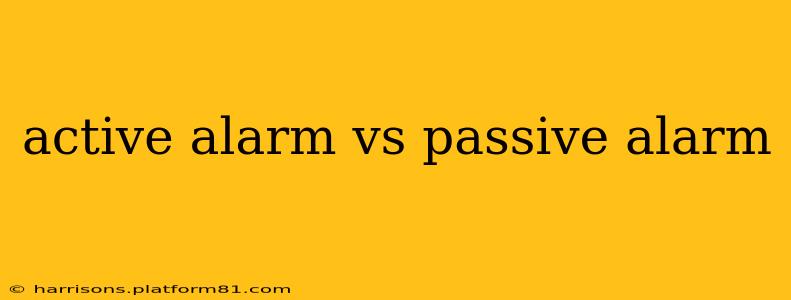Choosing the right type of alarm system for your home or business is crucial for security and peace of mind. Two primary categories exist: active alarms and passive alarms. While both aim to deter intruders and alert authorities, they differ significantly in their approach and capabilities. This article will delve into the core distinctions between active and passive alarm systems, helping you make an informed decision based on your specific needs and circumstances.
What is an Active Alarm System?
An active alarm system actively intervenes to deter or prevent intrusion. These systems typically incorporate features that directly react to a potential threat. Think of them as proactive security measures. Key characteristics include:
- Immediate Response: Active alarm systems react immediately to a detected intrusion. This could involve sounding a loud siren, triggering flashing lights, or even deploying other deterrents like water sprinklers or gas canisters (though the latter are less common in residential settings).
- Visible Deterrent: The very presence of an active alarm system, with its visible sensors and control panel, acts as a deterrent. Intruders are less likely to target a property that appears to be well-protected.
- Multiple Layers of Security: Active systems often integrate multiple technologies, such as motion detectors, door/window sensors, glass break detectors, and sometimes even CCTV cameras. This creates layers of protection, making it more difficult for intruders to bypass the system.
- Remote Monitoring (Optional): Many active alarm systems offer remote monitoring through a central monitoring station. This means that in the event of an alarm, a professional monitoring service will be notified and can contact emergency services.
What is a Passive Alarm System?
Passive alarm systems, in contrast, focus primarily on detection and notification. They don't actively intervene to stop an intruder; instead, they signal that an intrusion has occurred. These systems rely more on deterrence through the potential of an alarm and subsequent response.
- Detection Focus: The primary function of a passive alarm system is to detect unauthorized entry. This detection might trigger a silent alarm, sending a notification to a security company or homeowner, but it typically doesn't involve loud sirens or visible deterrents at the property itself.
- Less Obvious Deterrent: While a passive system does offer some deterrence, it's less obvious than an active system. Intruders might not be aware of its presence unless they trigger the alarm.
- Often Coupled with Other Security Measures: Passive systems are often used in conjunction with other security measures like security cameras or video surveillance systems to provide a comprehensive security solution.
- Remote Monitoring (Common): Passive alarm systems frequently utilize remote monitoring, providing an added layer of security and allowing for prompt response in case of intrusion.
What are the Pros and Cons of Each System?
Active Alarm System: Pros & Cons
Pros:
- Immediate Deterrent: The immediate response can scare off intruders.
- Visible Deterrent: The visible components act as a significant deterrent.
- Multiple Detection Methods: Offers a wider range of detection technologies.
Cons:
- Higher Installation Cost: Typically more expensive to install than passive systems.
- More Complex System: Can be more complex to maintain and troubleshoot.
- Potential for False Alarms: The sensitivity of the system can lead to occasional false alarms.
Passive Alarm System: Pros & Cons
Pros:
- Lower Installation Cost: Generally less expensive to install.
- Lower Maintenance: Usually simpler to maintain.
- Less Prone to False Alarms (Often): Depending on the system, less susceptible to false alarms compared to active systems.
Cons:
- No Immediate Deterrent: Doesn't actively stop the intruder.
- Less Visible Deterrent: The passive nature makes it a less visible deterrent.
- Reliance on Monitoring: Completely relies on timely response from the monitoring service.
Which System is Right for Me?
The best choice depends heavily on your individual needs and circumstances. Consider these factors:
- Budget: Passive systems are generally more budget-friendly.
- Property Type: High-value properties may benefit more from the added security of an active system.
- Location: Properties in high-crime areas might necessitate a more robust active system.
- Personal Preference: Some individuals prefer the added security and peace of mind provided by an active system's immediate response.
Ultimately, consulting with a security professional is highly recommended to determine the most appropriate alarm system for your specific requirements. They can assess your property, discuss your concerns, and recommend a system that provides optimal protection and fits your budget.
